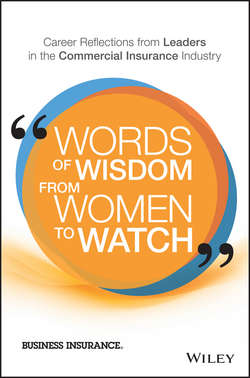Читать книгу Words of Wisdom from Women to Watch - Insurance Business - Страница 7
Chapter 1
I’m Strong
Building the Framework of Steel
ОглавлениеI was a little girl who loved to wear tutus and play in the mud with my army figurines. Growing up on military bases around the world, I was encouraged to be strong. All of my authority figures were strong. From my dad, who was in charge, to the Military Police who surrounded us every day, to my mother who packed up our lives every 18 to 36 months and moved us across the world. They were mentally and physically strong.
In addition to that military influence, my father was an attorney and my mother was a teacher; coupled with an outstanding vocabulary, I learned to joust effortlessly at the dinner table. Having strong opinions that you could back up with facts was a requirement. I was encouraged to participate in the discussions with the adults; a children’s table did not exist.
My mother’s favorite story to tell about me is when she picked me up from on my first day at Montessori school. Apparently, the directress (Montessori’s version of a principal) approached her at pickup time. My mother’s recollection of the conversation is as follows:
Directress: “Are you Ingrid’s mom?”
Mom: “I am.”
Directress: “Well, apparently, I don’t need to be here any longer, as your daughter is definitely in charge.”
Mom: “Why? What did she do?”
Directress: “Because she’s telling everyone what to do and everyone is listening to her.”
I was 18 months old.
They pushed me. They celebrated my accomplishments. They expected me to do well. I remember being in fifth grade. I was the only girl who sat in the “smart kids” row in our math class. My teacher, Ms. Andrade, would keep me after class and encourage me to raise my hand, to speak my mind. She told me that I had to be smart and strong.
I remember working my way through advanced placement classes in high school and being one of the only girls there. Girls were dropping like flies. It wasn’t cool to be smart. I kept on.
When I was 14, my world was rocked. My parents got divorced, and because we needed the money, I started answering phones at a salon and making appointments. I worked there almost every day after school until they closed at 9 P.M. Then I’d have to go home and do my homework, which taught me about a whole new type of strength.
Through college I worked multiple jobs, including managing large retail stores. I learned how to balance classes and life and run a business. I led some of the most successful branches of several national retailers. Despite all the successes, there were lessons about strength there, too. I’ll never forget the day that a district manager walked into our store, after a double-digit increase in sales year over year, and the only thing she had to say to me was that my skirt was too short. I was 20 years old. I began to dress differently, and I was angry about it. It was the first time I had run into someone asking me to change because I didn’t fit their expectation about how I should look or act.
When I walked into Corporate America at 24, I was a strong, confident, intelligent woman who didn’t understand hierarchy. I understood that rules were important for order, but I didn’t have any fear when it came to pointing out what could be done better.
My first Corporate America role was as a trading agent in a contact center that placed trades for 401(k)s. Six weeks into that job, I found myself standing in the chief information officer’s office one night telling him about all the changes I thought we should make to our platform. I laid out all my points, with supporting facts and solutions. He asked me who I was, but he didn’t tell me that, according to the rules, I wasn’t supposed to be bringing these recommendations directly to him.
He ended up listening to me, and we implemented many of the changes I’d suggested. He was my first big supporter. Because of that platform, I was afforded the opportunity to work with many of the giants in financial services. My career path was fast and furious, and I rose through the ranks quickly.
Again, that success was dotted with challenges that made me stronger. I experienced so much blatant sexism that it actually became a part of my strength. I wore higher-necked shirts. I stopped wearing skirts. I wore less makeup. I thought that was the way to stop it. I was called “Missy” and “Honey.” I spent years reminding men I worked with that my eyes were higher than my breasts.
I’ve been asked if it is “that time of the month.” I had a leader ask me if I’d “taken my pills” that day. Later, that same leader, at an event for which I’d been asked to give the keynote speech, said to the person who had arranged the entire event that his job was to “babysit Ingrid and make sure she stays out of trouble.”
And I kept on responding to all of this with humor and strength. We weren’t encouraged to report things like that – after all, “boys will be boys.” I was told to toughen up.
I got stronger.
